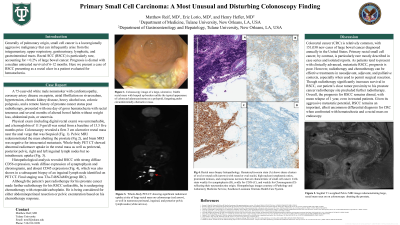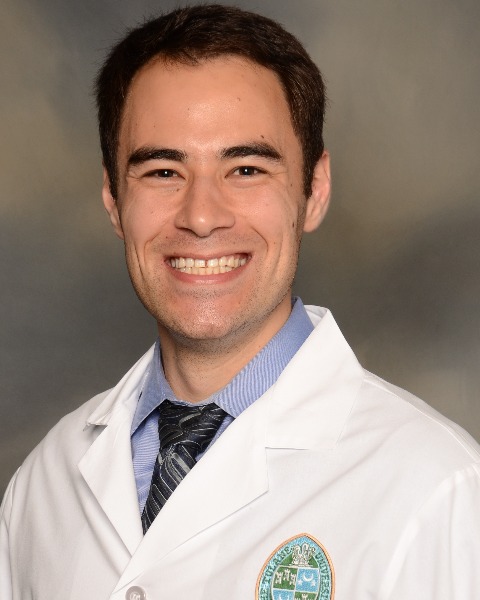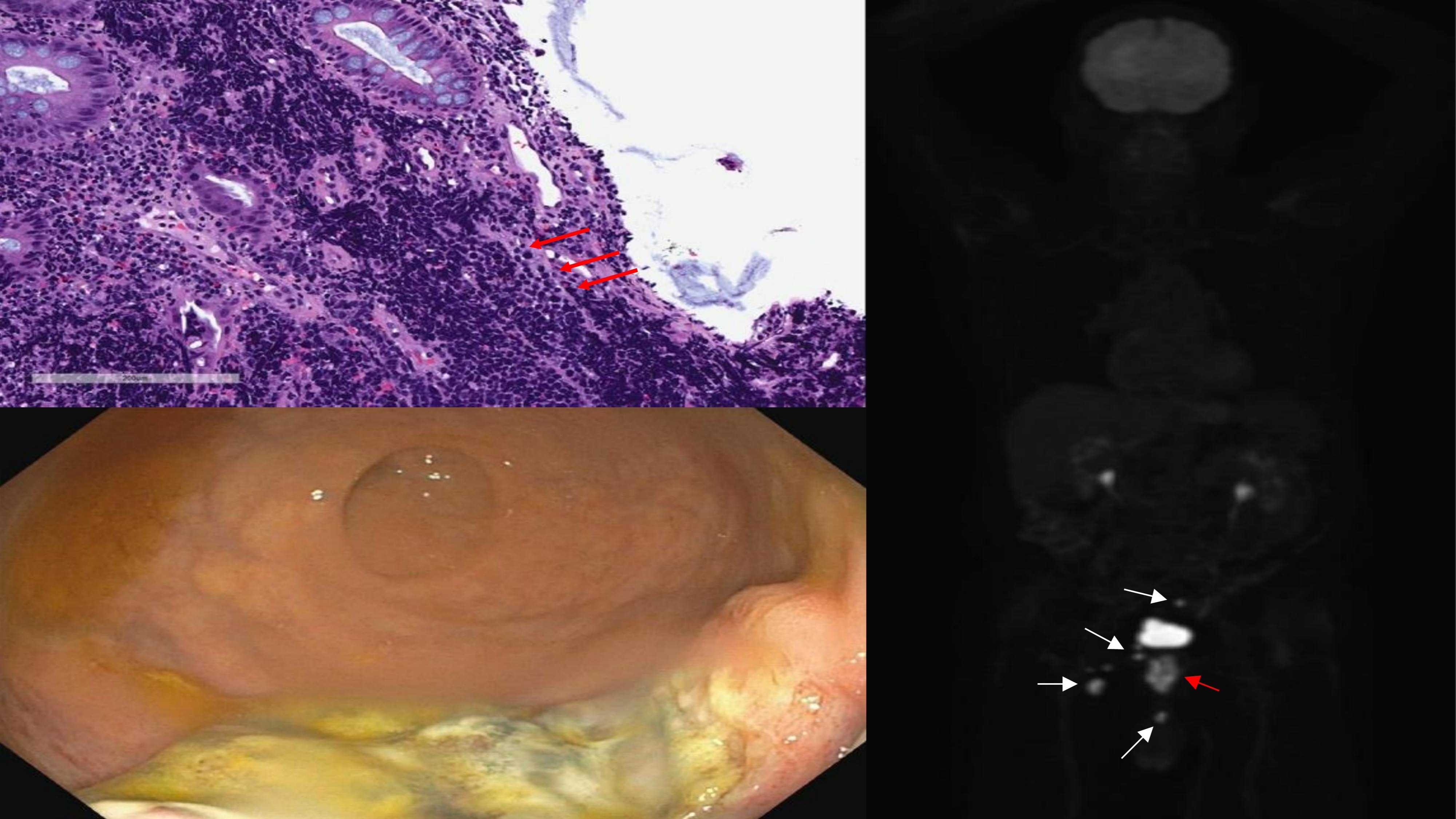Back


Poster Session C - Monday Afternoon
Category: Colon
C0115 - Primary Small Cell Carcinoma: A Most Unusual and Disturbing Colonoscopy Finding
Monday, October 24, 2022
3:00 PM – 5:00 PM ET
Location: Crown Ballroom

Has Audio

Matthew Reif, MD
Tulane University
New Orleans, LA
Presenting Author(s)
Matthew Reif, MD1, Eric Lorio, MD2, Henry Hefler, MD3
1Tulane University, New Orleans, LA; 2Tulane University, Metairie, LA; 3Department of Veterans Affairs, New Orleans, LA
Introduction: Generally of pulmonary origin, small cell cancer is a locoregionally aggressive malignancy that can infrequently arise from the integumentary, upper respiratory, genitourinary, lymphatic, and gastrointestinal tracts. Rectal SCC (RSCC) is particularly rare, accounting for < 0.2% of large bowel cancer. Prognosis is dismal with a median survival of 6-12 months. Here we present a case of RSCC presenting as a rectal ulcer in a patient evaluated for hematochezia.
Case Description/Methods: A 75-year-old male with atrial fibrillation on rivaroxaban and a remote history of prostate cancer status-post radiotherapy presented with 24 hours of hematochezia, rectal tenesmus, and diarrhea, but denied weight loss or abdominal pain. Hemoglobin trended from a baseline of 13.5 g/dL five months earlier to 11.9 g/dL upon presentation. Diagnostic colonoscopy revealed a firm 3 cm ulcerative rectal mass with heaped borders and friability 2 cm from the anal verge. Pelvic MRI showed the mass abutting the prostate without evidence of extension into adjacent tissues. Brain MRI was negative for intracranial metastasis, and whole-body PET CT showed abnormal uptake in the perirectal, posterior pelvic, right and left inguinal lymph nodes without intrathoracic uptake.
Histopathological analysis revealed RSCC with strong CD56 expression, weak expression of synaptophysin and chromogranin, and absent CD45 expression. FNA of the right inguinal lymph node confirmed lymphatic spread, establishing a final staging of T3a-T4bN2aM0 (group IIIC). Given his history of prostate radiation, he was not a candidate for further radiotherapy. He was induced on etoposide/carboplatin and is being considered for either abdominoperineal resection or pelvic exenteration.
Discussion: Colorectal cancer (CRC) is relatively common, with 151,030 new cases of large bowel cancer diagnosed annually in the United States, with 52,580 deaths per year. RSCC is often metastatic, portending a poor prognosis. Primary RSCC is particularly rare, though radiotherapy and chemotherapy can be an effective in neoadjuvant, adjuvant, and palliative contexts when combined with surgery. Though radiotherapy significantly increases survival in RSCC, our patient’s close tumor proximity to his prostate cancer radiotherapy site precluded further radiotherapy. Overall, the prognosis for RSCC remains dismal, with mean relapse of 1 year, even in treated patients. Although rare, our case highlights how RSCC should remain on the differential for both CRC and hematochezia.

Disclosures:
Matthew Reif, MD1, Eric Lorio, MD2, Henry Hefler, MD3. C0115 - Primary Small Cell Carcinoma: A Most Unusual and Disturbing Colonoscopy Finding, ACG 2022 Annual Scientific Meeting Abstracts. Charlotte, NC: American College of Gastroenterology.
1Tulane University, New Orleans, LA; 2Tulane University, Metairie, LA; 3Department of Veterans Affairs, New Orleans, LA
Introduction: Generally of pulmonary origin, small cell cancer is a locoregionally aggressive malignancy that can infrequently arise from the integumentary, upper respiratory, genitourinary, lymphatic, and gastrointestinal tracts. Rectal SCC (RSCC) is particularly rare, accounting for < 0.2% of large bowel cancer. Prognosis is dismal with a median survival of 6-12 months. Here we present a case of RSCC presenting as a rectal ulcer in a patient evaluated for hematochezia.
Case Description/Methods: A 75-year-old male with atrial fibrillation on rivaroxaban and a remote history of prostate cancer status-post radiotherapy presented with 24 hours of hematochezia, rectal tenesmus, and diarrhea, but denied weight loss or abdominal pain. Hemoglobin trended from a baseline of 13.5 g/dL five months earlier to 11.9 g/dL upon presentation. Diagnostic colonoscopy revealed a firm 3 cm ulcerative rectal mass with heaped borders and friability 2 cm from the anal verge. Pelvic MRI showed the mass abutting the prostate without evidence of extension into adjacent tissues. Brain MRI was negative for intracranial metastasis, and whole-body PET CT showed abnormal uptake in the perirectal, posterior pelvic, right and left inguinal lymph nodes without intrathoracic uptake.
Histopathological analysis revealed RSCC with strong CD56 expression, weak expression of synaptophysin and chromogranin, and absent CD45 expression. FNA of the right inguinal lymph node confirmed lymphatic spread, establishing a final staging of T3a-T4bN2aM0 (group IIIC). Given his history of prostate radiation, he was not a candidate for further radiotherapy. He was induced on etoposide/carboplatin and is being considered for either abdominoperineal resection or pelvic exenteration.
Discussion: Colorectal cancer (CRC) is relatively common, with 151,030 new cases of large bowel cancer diagnosed annually in the United States, with 52,580 deaths per year. RSCC is often metastatic, portending a poor prognosis. Primary RSCC is particularly rare, though radiotherapy and chemotherapy can be an effective in neoadjuvant, adjuvant, and palliative contexts when combined with surgery. Though radiotherapy significantly increases survival in RSCC, our patient’s close tumor proximity to his prostate cancer radiotherapy site precluded further radiotherapy. Overall, the prognosis for RSCC remains dismal, with mean relapse of 1 year, even in treated patients. Although rare, our case highlights how RSCC should remain on the differential for both CRC and hematochezia.

Figure: Top Left: Rectal mass biopsy under hematoxylin-eosin stain shows dense clusters of oval or round cells (red arrows) with round or oval nuclei, high nuclear/cytoplasmic ratios, prominent mitoses, and conspicuous necrosis that are characteristic of small cell cancer.
Bottom Left: Colonoscopy image of a large, ulcerative, friable rectal mass with heaped up borders unlike the typical appearance of adenocarcinoma, which more often presents with a polypoid mass or obstructing lesion.
Right: PET-CT slice showing significant radiotracer uptake at site of large rectal mass on colonoscopy (red arrow) and numerous perirectal, posterior pelvic, and inguinal lymph nodes (white arrows).
Bottom Left: Colonoscopy image of a large, ulcerative, friable rectal mass with heaped up borders unlike the typical appearance of adenocarcinoma, which more often presents with a polypoid mass or obstructing lesion.
Right: PET-CT slice showing significant radiotracer uptake at site of large rectal mass on colonoscopy (red arrow) and numerous perirectal, posterior pelvic, and inguinal lymph nodes (white arrows).
Disclosures:
Matthew Reif indicated no relevant financial relationships.
Eric Lorio indicated no relevant financial relationships.
Henry Hefler indicated no relevant financial relationships.
Matthew Reif, MD1, Eric Lorio, MD2, Henry Hefler, MD3. C0115 - Primary Small Cell Carcinoma: A Most Unusual and Disturbing Colonoscopy Finding, ACG 2022 Annual Scientific Meeting Abstracts. Charlotte, NC: American College of Gastroenterology.
